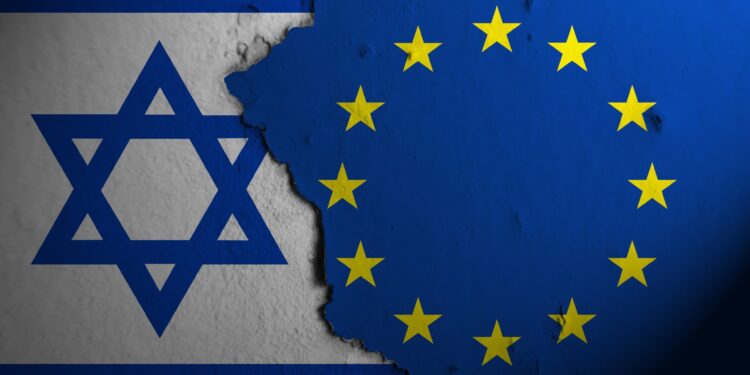In an unprecedented escalation in relations between Israel and the European Union, the Netherlands government called for a comprehensive review of the partnership agreement (the Euro-Israeli), which is the basic legal and commercial framework for relations between the two sides.
This call came, according to the Israeli newspaper Calcalist, in response to what the Netherlands described as “the serious violation of international humanitarian law” due to the prevention of the entry of humanitarian aid to the Gaza Strip.
The newspaper stated in a report entitled “Relations between Israel and Europe are about to a possible earthquake,” that the Dutch move constitutes a difference in European tone, and reveals an increasing cracking in political confidence with Tel Aviv, at a time when calls for reconsideration of the partnership agreement that governs the institutional relations between the two sides for more than two decades are increasing.
A human rights item restores the agreement to the discussion table
The Dutch objection is based on the second clause of the agreement, signed between Israel and the European Union in 1995 (and the implementation since 2000), which obliges the two parties to respect human rights and democratic principles as a basis for cooperation. According to the Dutch Foreign Minister, Israel violated this item starkly.
Although the Netherlands considered a traditional ally of Israel within the union, it announced its refusal to extend the joint work program unless an official review of the agreement was made.
It was decided that the Dutch proposal for discussion will be presented at the meeting of the European Union’s foreign ministers to be held on May 20 in Brussels.
Increased European support and limited opposition
The Dutch initiative received immediate support from several influential European countries, including France, Spain, Ireland and Portugal, and even joined Sweden recently, indicating a transformation of the European mood towards Israel.
On the other hand, Germany, Austria and Hungary expressed severe opposition, describing the move as it might harm the union’s relationship with a “central partner”.
Despite this division, estimates – according to Kallest – indicate that opening the path of reviewing the agreement does not require consensus, but rather a simple majority, which makes it difficult for Israel to rely on the opposition countries to obstruct the decision.
Beyond the economy … the partnership agreement is the cornerstone of the relationship
The newspaper confirms that the agreement is not limited to trade exchange, but rather includes strategic areas such as scientific research, education, agriculture, transportation, security and culture, and gives Israel preference to the European market.
The agreement was used over the years as a platform for expanding cooperation, but it was also a political pressure tool during crises with the Palestinians, especially in the context of wars on the Gaza Strip.
Unlike previous cases in which European countries were satisfied with political statements, the Dutch initiative represents the first official move within the Federation’s institutions to review the relationship.
The report describes this step as “a clear institutional transformation in Europe’s position on Israel, even by traditional allies.”
The report warns that freezing or amending the agreement will affect Israel’s ability to maintain its integration into the European space, not only economically, but as a source of political and diplomatic legitimacy.
Dear Israeli responses and warnings of the loss of influence
According to what I quoted as Kallest, foreign relations experts in Israel believe that this step represents the peak of political spacing between Tel Aviv and Brussels since the military escalation after October 7, 2023.
They affirm that Israel should move immediately to contain this threat through diplomatic paths, and to warn that such steps will undermine the European Union’s ability to influence the Middle East.
They also warned that the loss of Israeli confidence in Europe will reduce cooperation in strategic issues, and may have prompted Israel to escalate its policies on the Palestinian scene in a way that contradicts the goals of the Union.
Suggestions to alleviate the escalation
The report suggested that Israel initiate a tight humanitarian plan in the Gaza Strip that satisfies the Europeans, and shows a willingness to respect international humanitarian law. He stressed the importance of presenting concrete evidence to introduce aid, and published this through direct diplomatic media and communications.
At the end of the report, Ron Friedman, a researcher at the Mind Israel Foundation, described the partnership agreement as “the main pillar that integrates Israel into the European camp at the economic, cultural and international levels, and any crack in it will weaken its global position, whether it loved it or not.”



